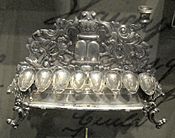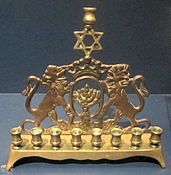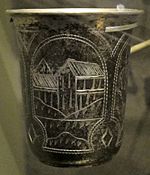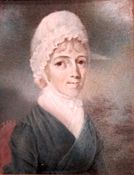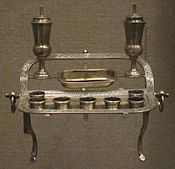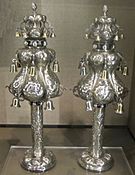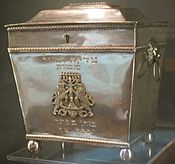Weitzman National Museum of American Jewish History facts for kids
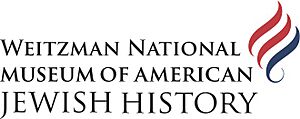 |
|
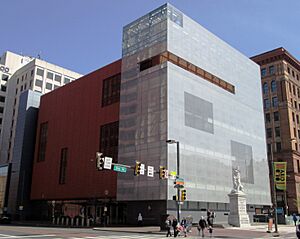 |
|
| Lua error in Module:Location_map at line 420: attempt to index field 'wikibase' (a nil value). | |
| Former name | National Museum of American Jewish History |
|---|---|
| Established | 1976 |
| Location | Philadelphia, Pennsylvania, U.S. |
| Type | Jewish Museum |
| Collection size | 30,000 objects |
| Visitors | 82,950 (2019) |
| Architect | James Polshek |
| Public transit access | |
The Weitzman National Museum of American Jewish History, also known as The Weitzman, is a special museum in Philadelphia, Pennsylvania. It's connected with the famous Smithsonian museums, which means it's a really important place! You can find it in the heart of Philadelphia, right on Independence Mall. This museum first opened its doors in 1976.
Contents
Museum History: From Start to Today
The Weitzman Museum began in 1976. Back then, it was a smaller museum, about 15,000 square feet. It shared a building with a synagogue called Congregation Mikveh Israel.
A New Home for the Museum
In 2005, plans were made for the museum to move to a brand-new building. This new home was built at Fifth Street and Market Street on the Independence Mall. The building's construction started on September 30, 2007.
The new museum building is much larger, about 100,000 square feet. It was designed by an architect named James Polshek. The building is made of glass and terra-cotta. It includes a big open area called an atrium, a large space for exhibits, a center for education, and a theater.
The new building officially opened on November 14, 2010. Over 1,000 people attended the opening ceremony, including important leaders like Vice President Joe Biden. The museum welcomed the public on November 26, 2010.
Challenges and a New Name
In March 2020, like many places, the museum temporarily closed because of the COVID-19 pandemic. The museum faced some financial difficulties around this time. However, it worked hard to solve these problems.
In September 2021, the museum successfully resolved its financial challenges. Some groups helped by forgiving debt, and a board member bought the museum building. This allowed the museum to continue its important work.
In August 2020, the museum's online gift shop got a lot of attention. This happened after a public figure mispronounced a national park's name, which sounded like a phrase on one of the museum's T-shirts. Sales of this "Yo Semite" T-shirt brought in unexpected money and helped the museum greatly.
In November 2021, the museum received a very generous gift from Stuart Weitzman. Because of his support, the museum was renamed The Weitzman National Museum of American Jewish History.
Exploring the Museum's Exhibitions
The Weitzman Museum has a huge collection of over 30,000 objects. These items show the lives and experiences of Jewish people in America from early times to today. Past exhibits have featured famous people like Ruth Bader Ginsburg and Leonard Bernstein.
George Washington and Religious Freedom
In 2012, the museum held a special exhibit about religious freedom in the United States. It featured a very important letter written in 1790 by George Washington. This letter was sent to a Jewish community in Newport, Rhode Island.
In his letter, George Washington promised that the new American government would protect religious freedom and equality for everyone, no matter their faith. The exhibit also included other historical items, like early copies of the Declaration of Independence and the Constitution.
The 'Only in America' Hall of Fame
The museum also has a special area called the 'Only in America' Gallery and Hall of Fame. It was created in 2010 to honor important Jewish Americans. The first group of eighteen people was chosen by public vote and by experts.
This exhibit features a film about the lives of these honored individuals. It also displays interesting items, like Sandy Koufax’s baseball mitt and sheet music from Irving Berlin. The Hall of Fame celebrates Jewish Americans who have made a big difference in different fields.
| Honoree | Category | Year Inducted | Notes |
|---|---|---|---|
| Irving Berlin | Arts & Entertainment | 2010 | |
| Leonard Bernstein | Arts & Entertainment | 2010 | |
| Louis Brandeis | Politics, Law, & Activism | 2010 | |
| Albert Einstein | Science & Medicine | 2010 | |
| Mordecai Kaplan | Religion & Thought | 2010 | |
| Sandy Koufax | Sports | 2010 | |
| Estée Lauder | Business & Philanthropy | 2010 | |
| Emma Lazarus | Literature | 2010 | |
| Isaac Leeser | Religion & Thought | 2010 | |
| Golda Meir | Politics, Law, & Activism | 2010 | |
| Jonas Salk | Science & Medicine | 2010 | |
| Menachem Mendel Schneerson | Religion & Thought | 2010 | |
| Rose Schneiderman | Politics, Law, & Activism | 2010 | |
| Isaac Bashevis Singer | Literature | 2010 | |
| Steven Spielberg | Arts & Entertainment | 2010 | |
| Barbra Streisand | Performance | 2010 | |
| Henrietta Szold | Politics, Law, & Activism | 2010 | |
| Isaac Mayer Wise | Religion & Thought | 2010 | |
| Julius Rosenwald | Business & Philanthropy | 2016 | |
| Gertrude Elion | Science & Medicine | 2017 | |
| Ruth Bader Ginsburg | Politics, Law, & Activism | 2019 | |
| Harry Houdini | Performance | 2020 | |
| David Copperfield | Performance | 2020 |
Images for kids
See also
- List of Jewish museums
- National Museum of American Jewish Military History
 | Laphonza Butler |
 | Daisy Bates |
 | Elizabeth Piper Ensley |


